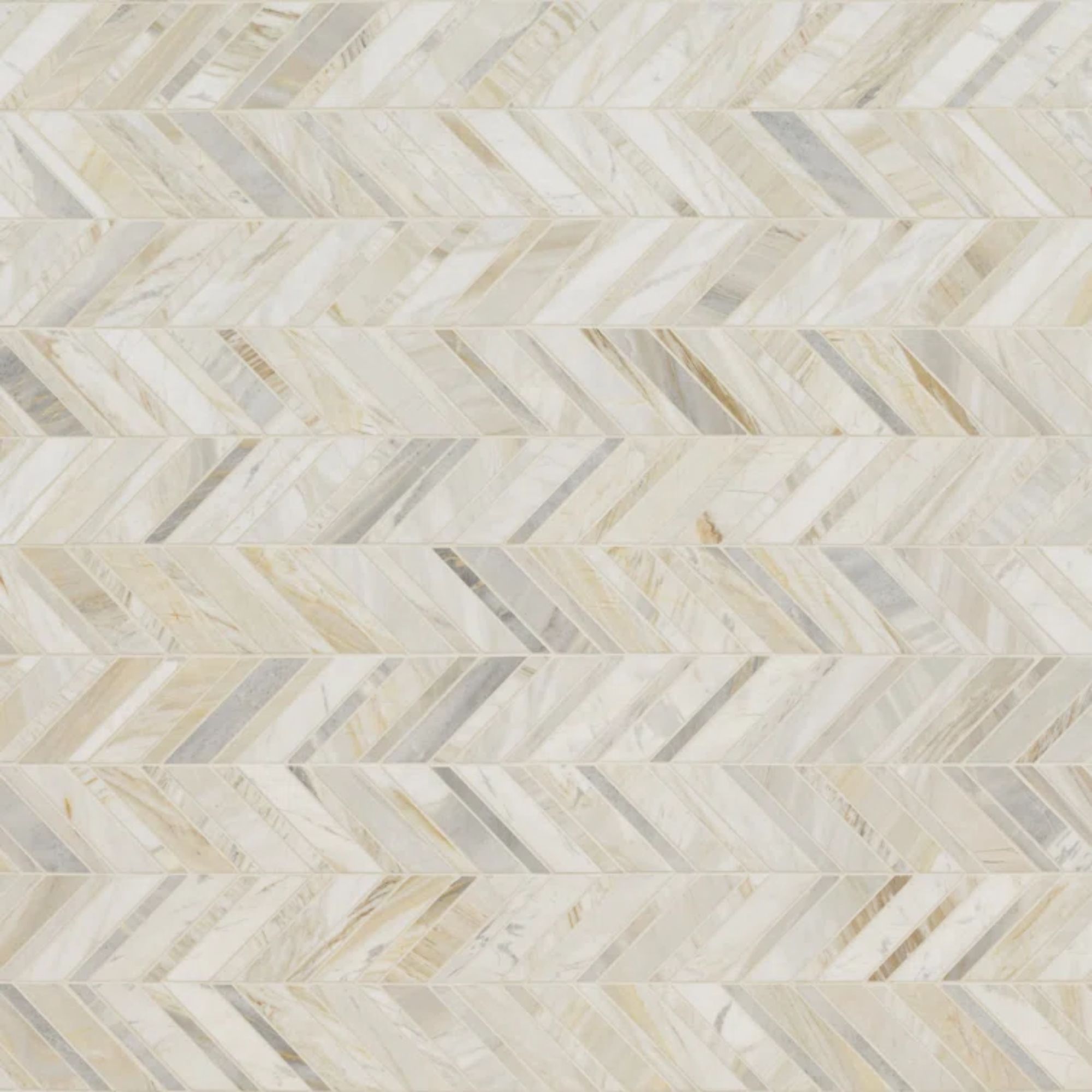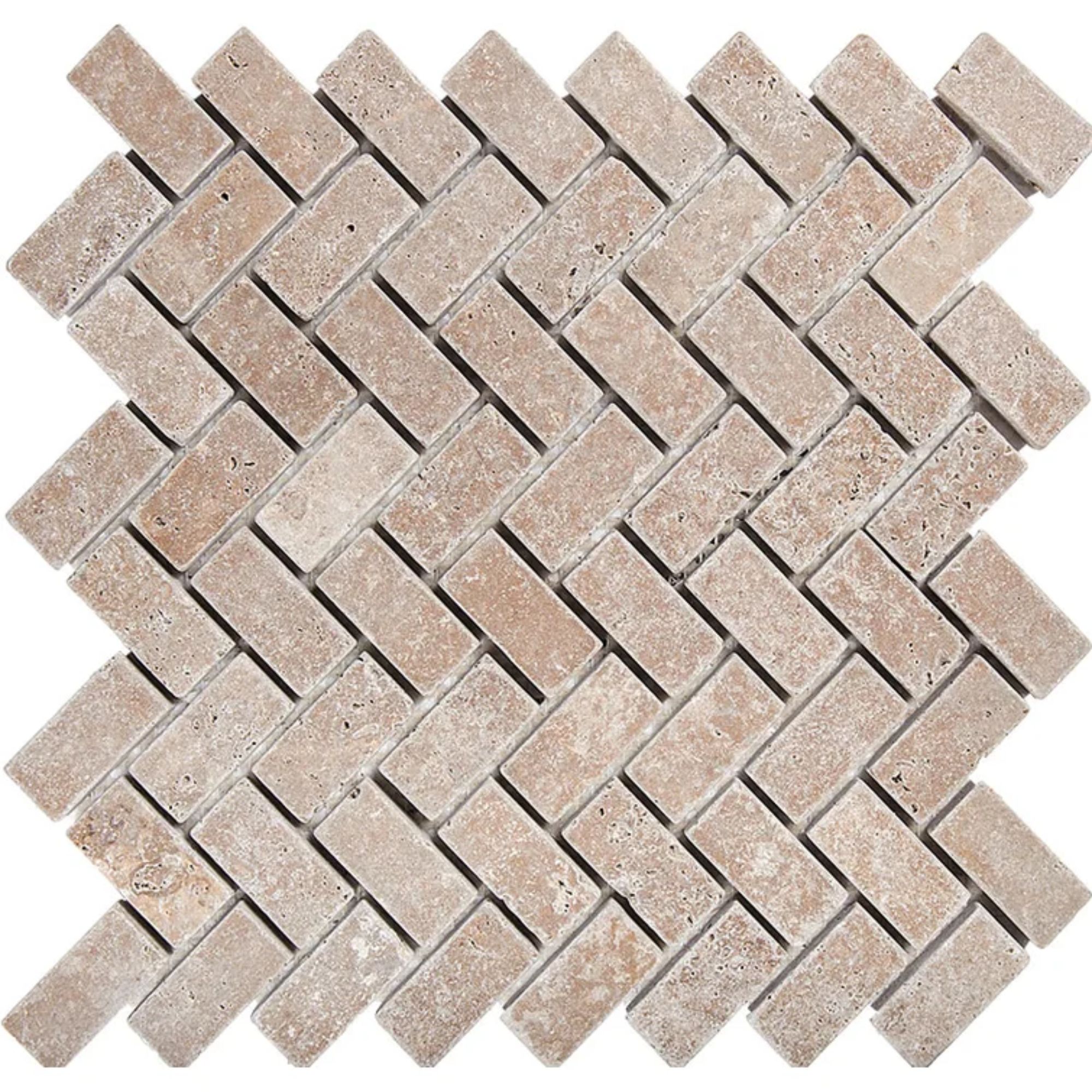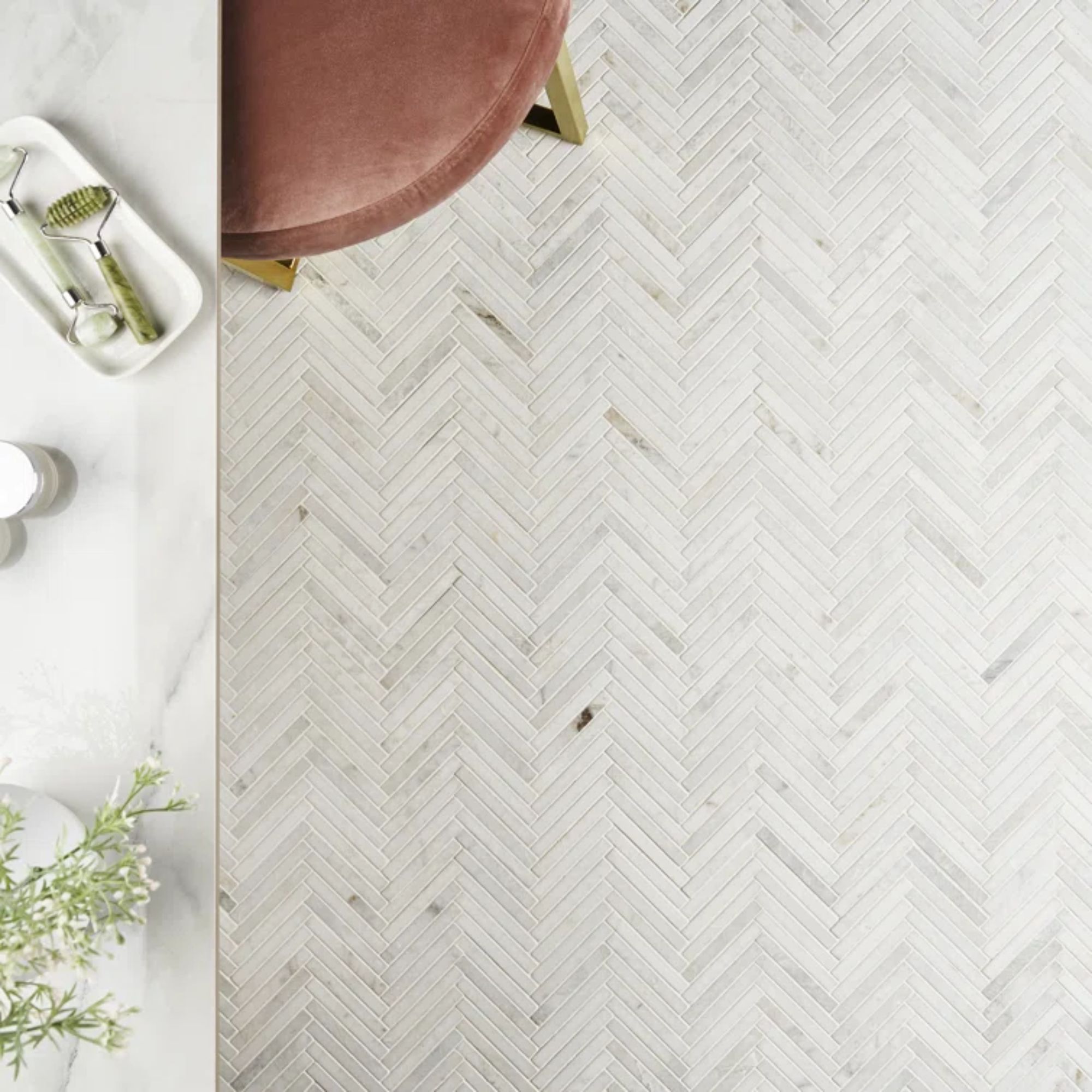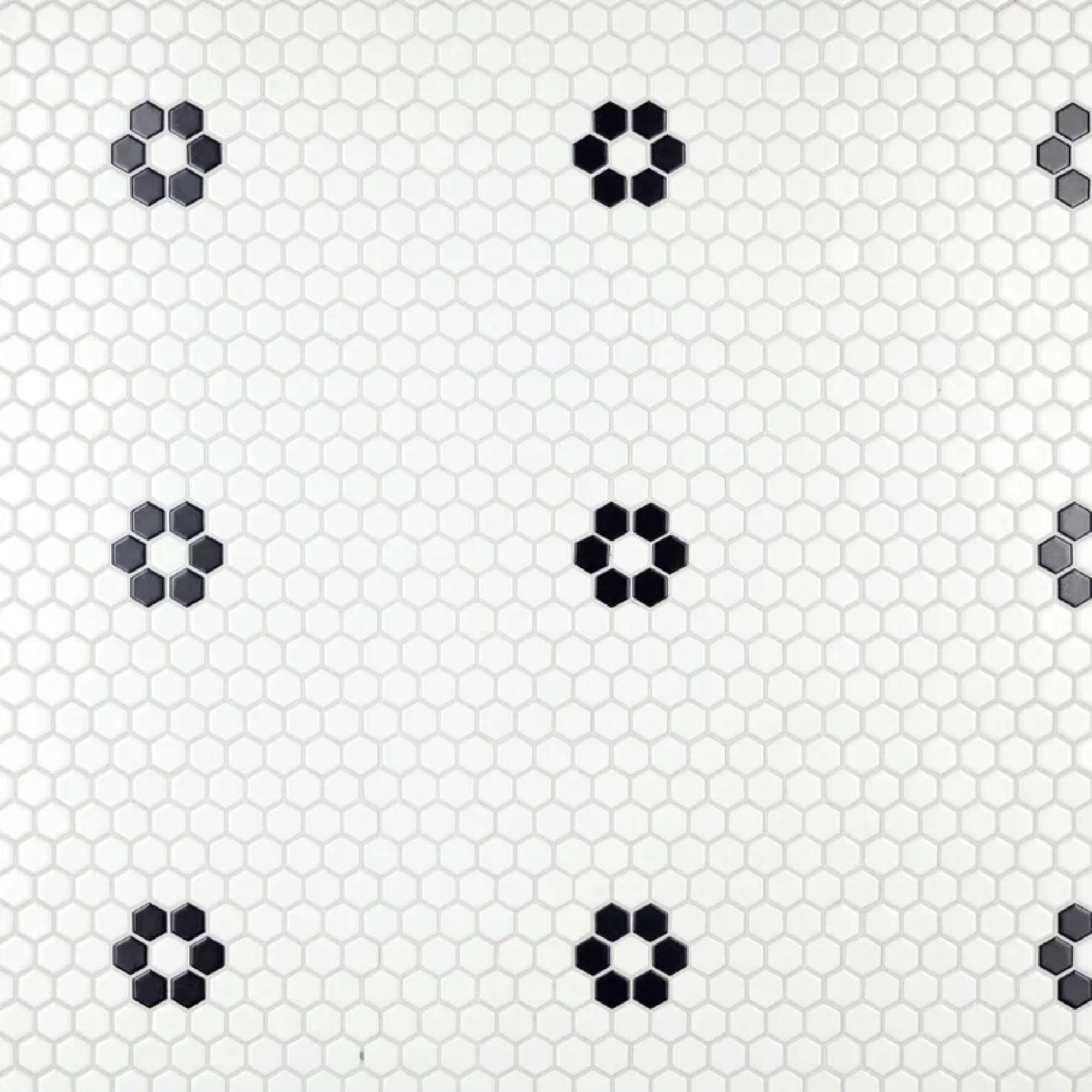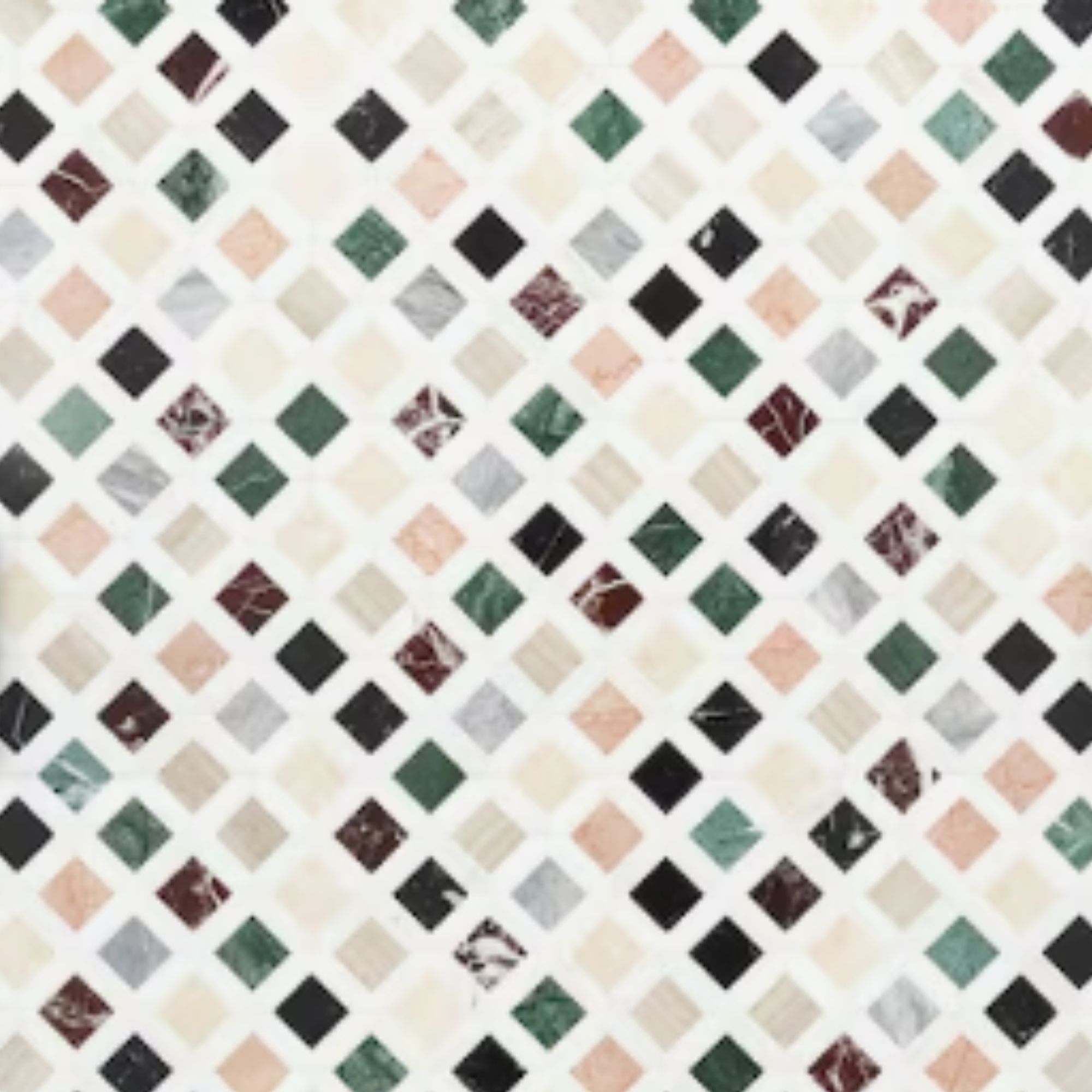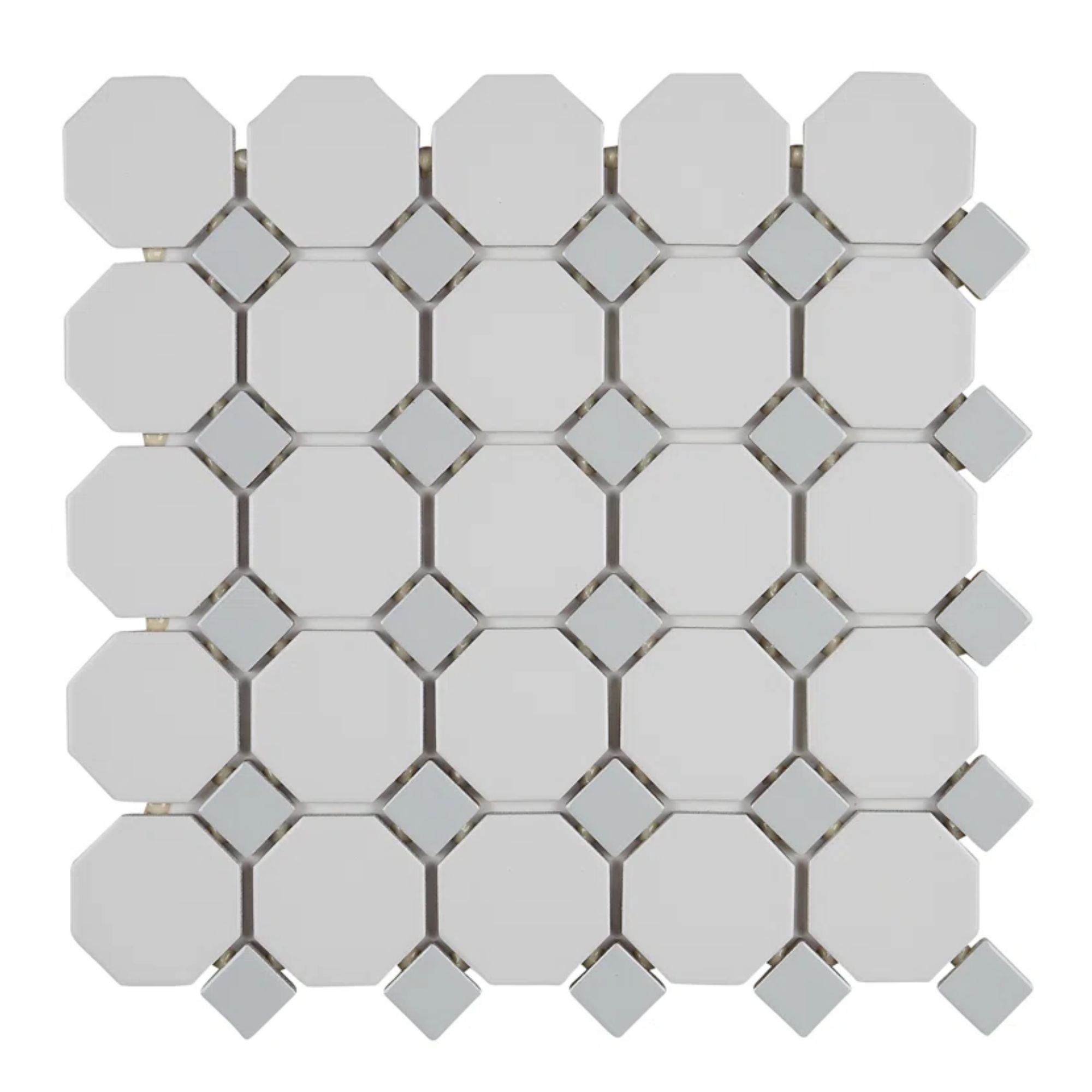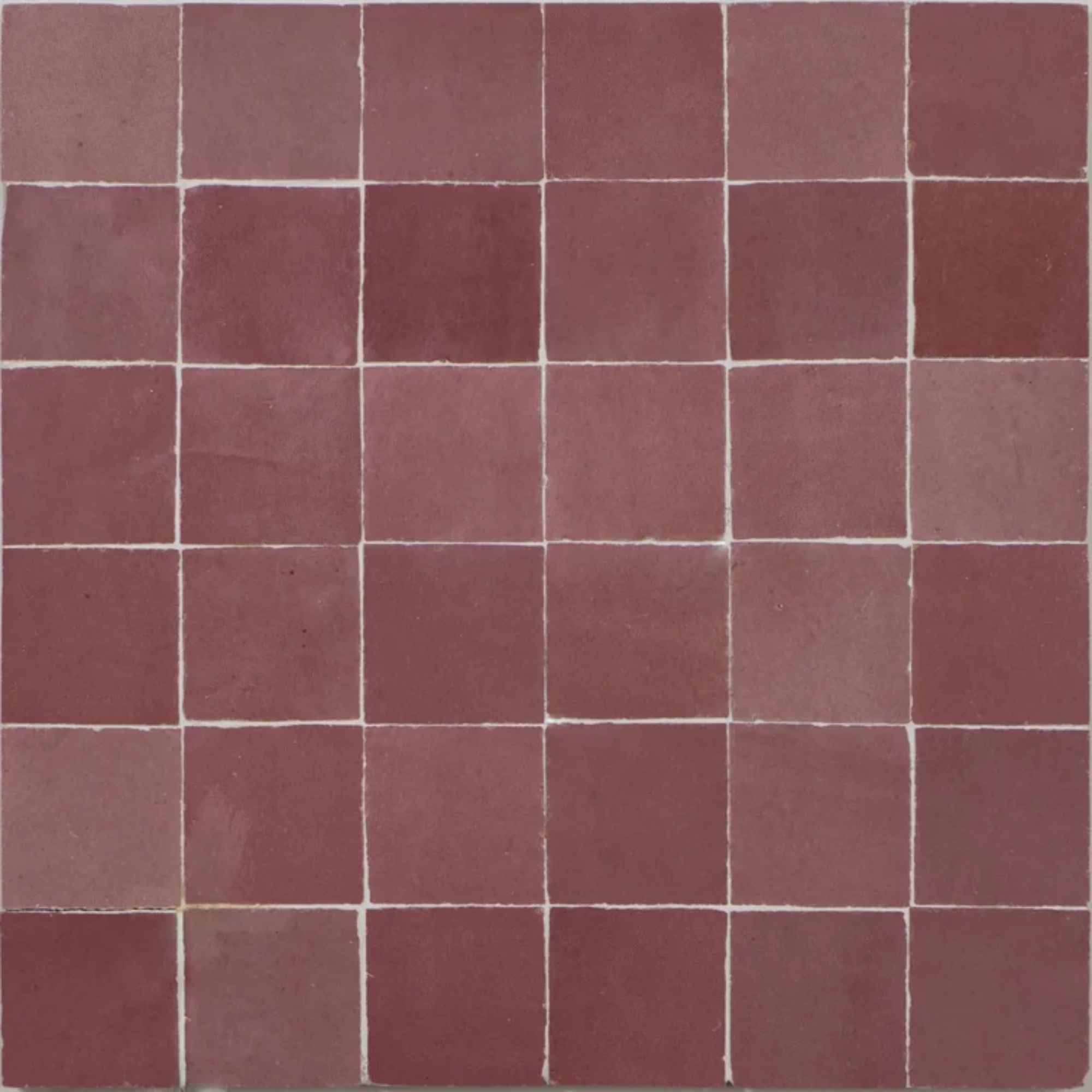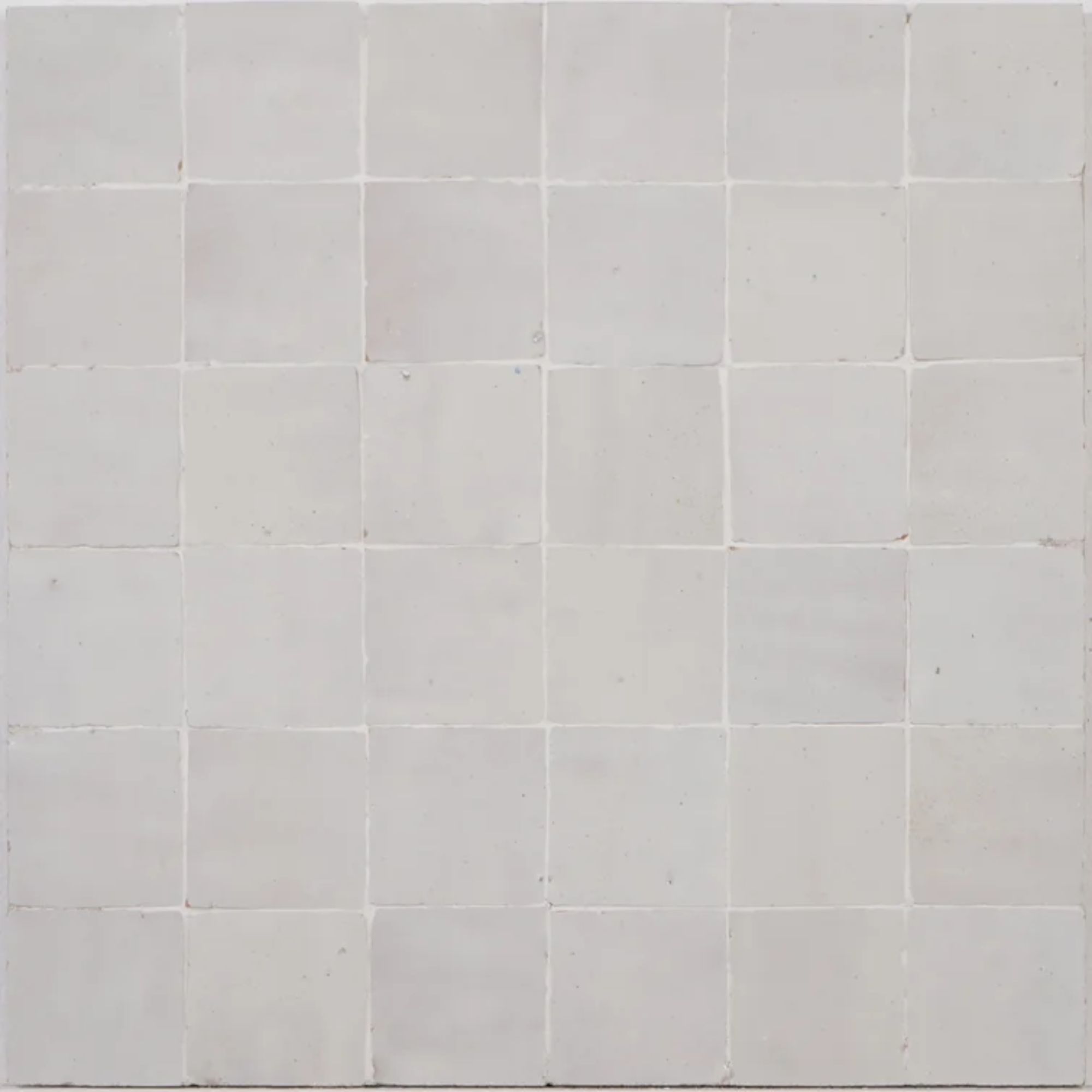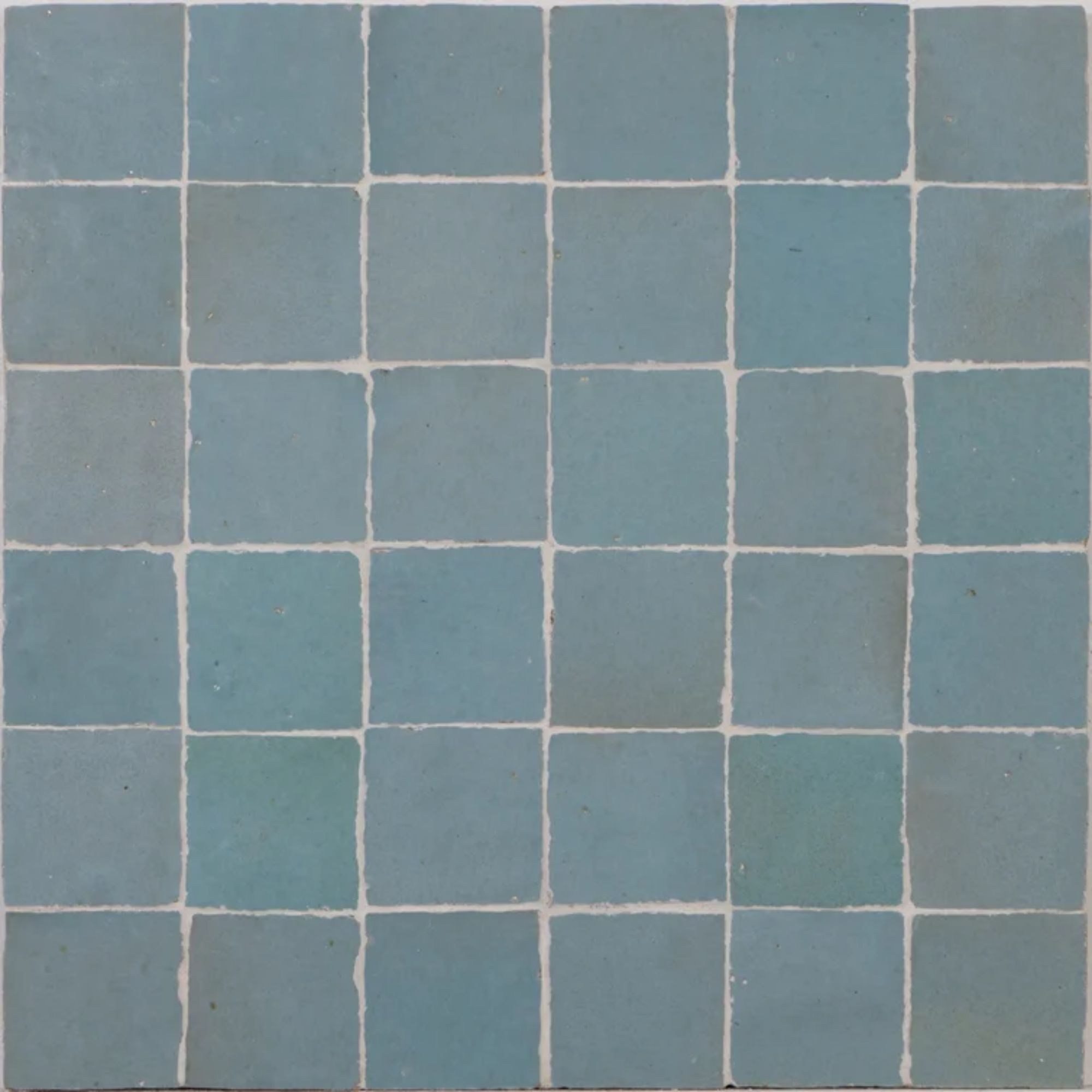15 bathroom flooring ideas designers always return to
Combining functional materials and timeless style, these are the bathroom flooring ideas to know about

Molly Malsom
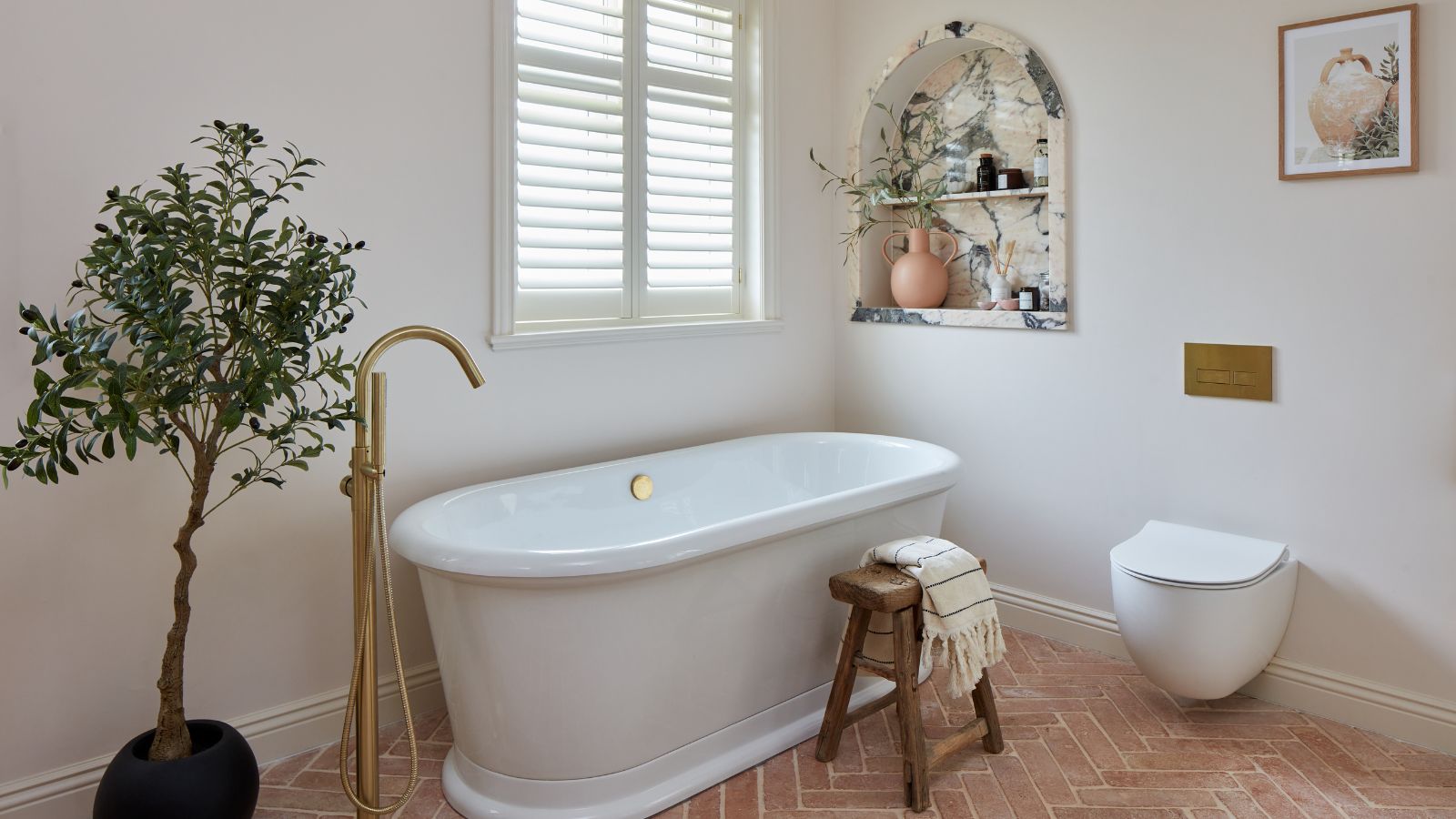
- 1. Create a natural feel with real stone
- 2. Use two colors to make a checkerboard
- 3. Add texture with a herringbone pattern
- 4. Indulge with marble or marble-effect tile
- 5. Add warmth with traditional wooden flooring
- 6. Take up the terrazzo trend
- 7. Boost the sense of space with large format tiles
- 8. Make the most of mosaics
- 9. Get the look of wood with porcelain
- 10. Infuse a Mediterranean look with terracotta
- 11. Tile drench a bathroom for a bold look
- 12. Go super contemporary with microcement
- 13. Embrace a timeless pattern with stripes
- 14. Look to handmade tiles for a rustic feel
- 15. Take your floor tiles up and over the walls too
- What is the best type of flooring for a bathroom?
- How do I choose bathroom flooring with slip resistance?
- How much does bathroom flooring cost?
Bathroom flooring ideas deserve some special attention. Often, we start a bathroom renovation with a color palette, interior design style, or wall tile in mind, but what about creating some wow-factor underfoot?
There are a few considerations to get right at first glance. The material, of course, must be durable, able to withstand frequent splashes of water, anti-slip underfoot, and preferably easy to clean.
But practicality doesn’t mean boring, since there are so many solutions that combine style with functionality – whether you want a statement pattern to add personality and a burst of color or a more neutral and seamless look that serves as a simple backdrop to a showpiece bathtub or vanity unit.
It makes sense to consider all your bathroom ideas, and especially the flooring, as part of the plan at the outset, as the best way to create a cohesive scheme. So, to help you do just that and bring a little inspiration, we've asked the experts for their favorite bathroom flooring ideas.
15 Stylish Flooring Ideas For Your Bathroom
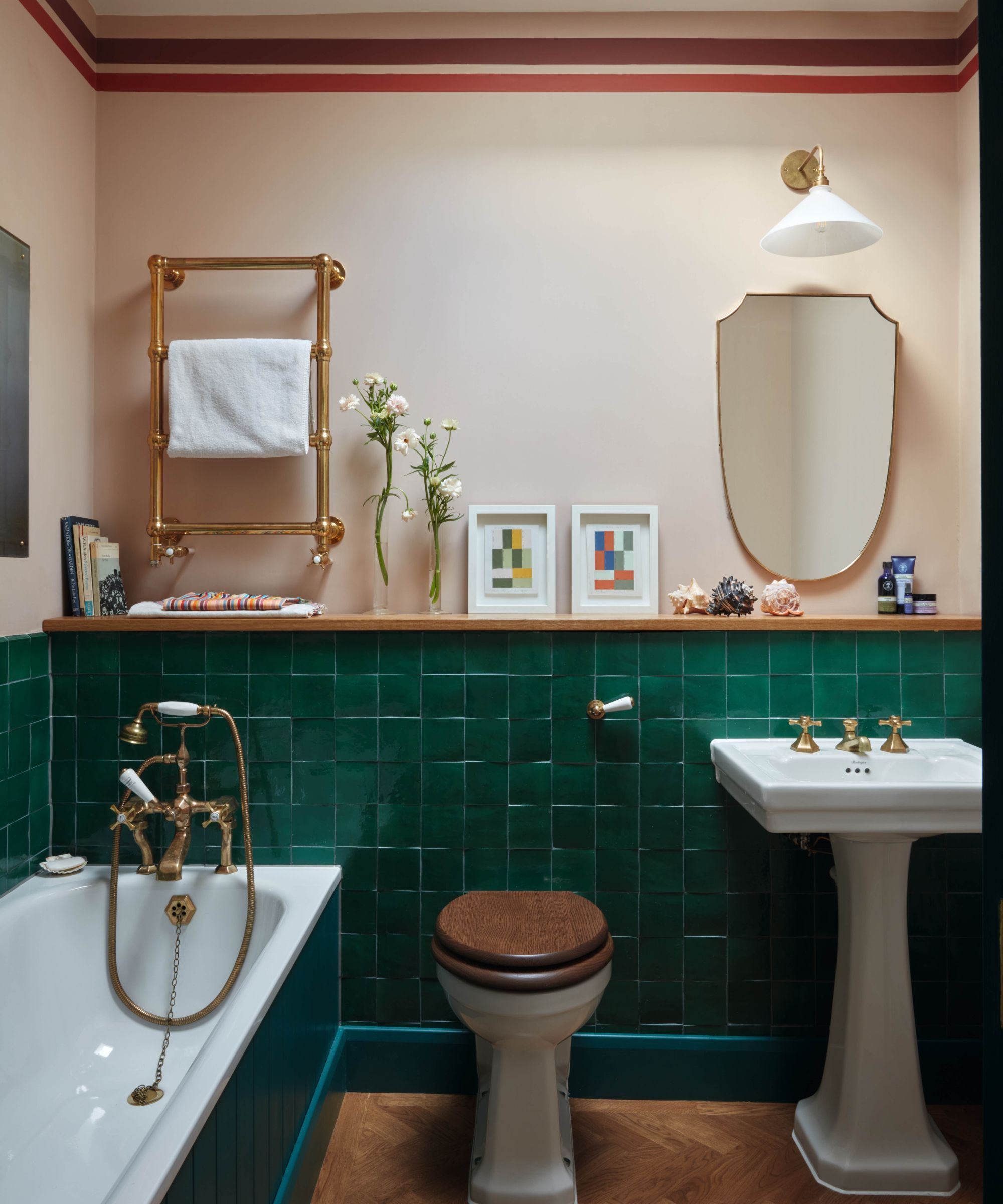
Whether you're seeking ideas for a total bathroom remodel or simply just looking to replace a tired floor, the options are endless, and it can be quite overwhelming knowing where to begin your search.
Some types of tiles are only suitable for walls; some materials are not suitable for bathroom flooring since they may be damaged by repeated contact with water or be too slippery, and some are not suitable for underfloor heating. The golden rule? Always check with your supplier before purchasing.
'When it comes to bathroom floors, the options are limitless and can be overwhelming,' says interior designer Taniya Nayak. 'I always recommend going with three sizes of tile: smallest on the shower floor to allow for the slope for proper draining, medium on the walls, and larger for the bathroom floor.'
Design expertise in your inbox – from inspiring decorating ideas and beautiful celebrity homes to practical gardening advice and shopping round-ups.
'Of course, these can be mixed and matched, but it’s generally a good rule of thumb when it comes to picking out tiles and flooring for your bathroom. If you’re nervous about color, choosing various shades/tones of the same color is usually a foolproof way to create a successful bathroom scheme,' she adds.
If you're unsure where to start, we've spoken with bathroom designers, tile experts, and interior designers to get their top 15 bathroom flooring ideas they're loving right now.
1. Create a natural feel with real stone
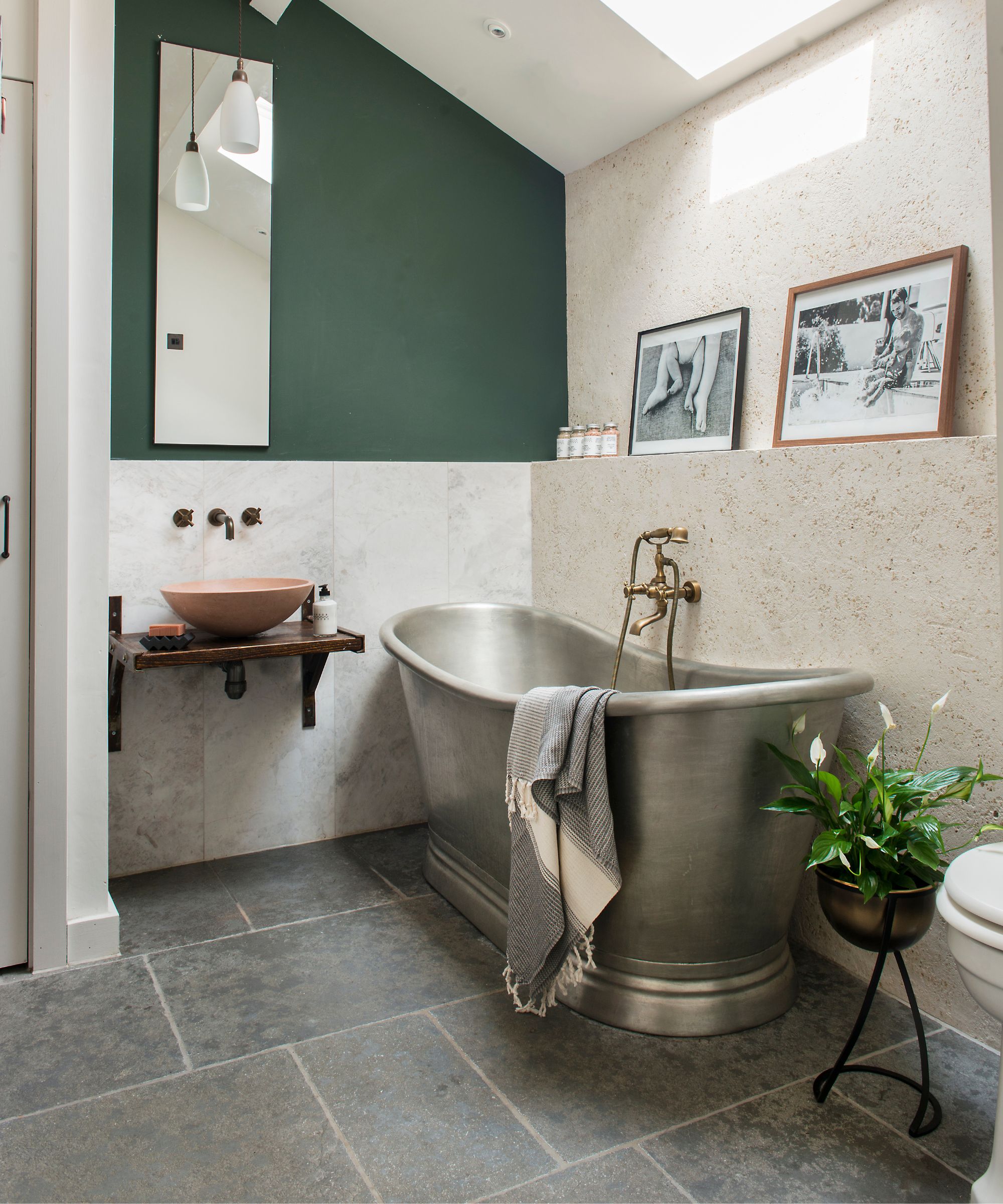
An age-old tile idea that would look just as at home in both contemporary and traditional homes is a real, natural stone floor. Real stone flooring adds an undeniable sense of luxury and authenticity to any bathroom. Each slab boasts its own unique patterns and variations, ensuring a one-of-a-kind aesthetic that can't be replicated with synthetic materials.
With proper care and maintenance, it can withstand years of wear and tear without losing its luster. Grazzie Wilson, head of creative at Ca' Pietra, says: 'Having a chic natural stone floor is a surefire way to add value to your home. It makes total sense – a solid stone floor is timeless, it’s dependable, and it’s something solid in which you can invest in without worry.'
Do just consider that sealing a stone floor in a bathroom is crucial to protect the porous surface of natural stone from moisture and stains to help preserve its beauty for years to come. From tumbled marble to textured travertine or limestone for a more rustic feel, the options are endless.
2. Use two colors to make a checkerboard

The checkerboard pattern is a timeless choice that can adapt to various interior design styles and adds a sense of whimsy without overwhelming the space. So long as you get the color palette right. Contrasting colors, such as traditional black and white or navy and gray, create a bold statement and draw the eye. However, you can also opt for more subtle combinations, like soft beige and cream, or a terracotta-toned Rosso marble and white.
Barrie Cutchie, design director at BC Designs, agrees. 'Checkerboard floor has a long history, but when used with modern color palettes, it is a great way of bringing the two periods together. It's a versatile look that can work in most bathrooms. The overall look will depend more on the colors chosen than anything else, as it doesn’t have to be traditional white and black. Instead, contrasting, or similar shades can be used that can soften and warm the space.'
'Checkerboard patterns have been used in interior design for centuries, evoking a sense of timeless elegance and sophistication,' says interior designer Montana Labelle. 'When combined with marble, a material known for its luxury and durability, the result is a bathroom flooring option that exudes opulence and refinement. We love mixing unexpected marbles to create a dramatic effect.'
The honed finish of the marble seen above creates a more matte result, making it less slippery than a polished surface. Like all marble, it will need sealing to reduce staining.
3. Add texture with a herringbone pattern
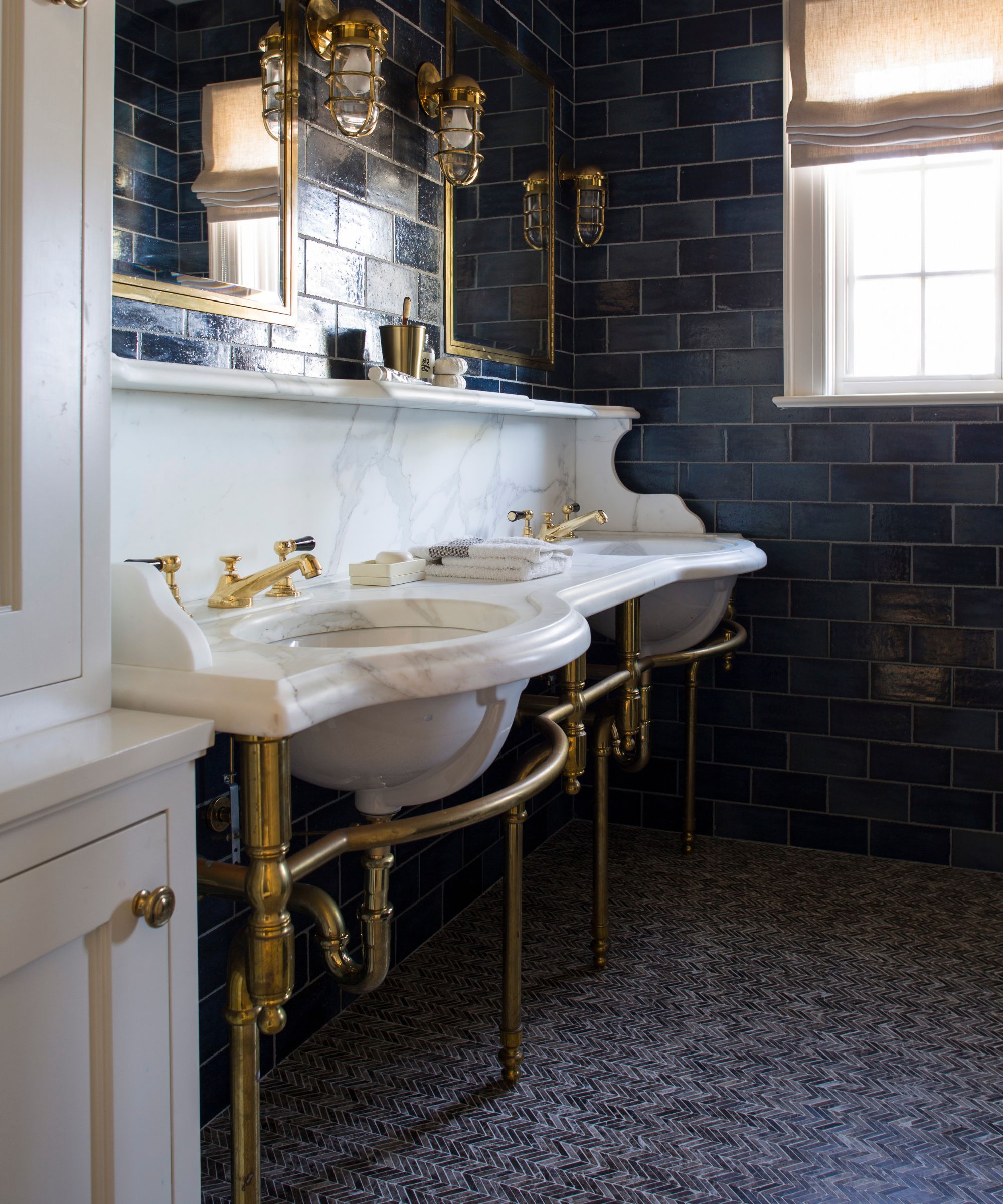
Whether you opt for traditional hardwood, sleek porcelain tiles, or even luxury vinyl planks, the herringbone pattern can adapt to a variety of materials and design aesthetics. This classic design choice not only adds visual interest but also introduces a sense of texture and dimension that can transform a bathroom.
'We like to create contrast and interest by using unique materials for bathroom floors,' says Young Huh, interior designer and creator of the bathroom seen above. 'For instance, here we used a small herringbone pattern which contrasts with the dark navy brick subway tile. They both have a masculine-moody feeling but are also different enough from each other to keep the materials interesting.'
Herringbone tiles are a favorite among designers for their ability to infuse bathrooms with elegance and character. Its distinct zigzag arrangement creates a sense of movement and depth that can make even the smallest of bathrooms feel more spacious.
4. Indulge with marble or marble-effect tile

Marble bathroom ideas always feel luxurious. Long celebrated for its natural beauty, each slab of marble will feature different natural veining and individual coloration, making it especially prized as a high-end bathroom flooring idea.
'Marble and other natural materials exude a restful quality that's ideal for relaxing, spa-style bathrooms,' says James Sirett, head of product at Fired Earth. 'Bathrooms tend to be quite compact, making them relatively affordable to tile, so they're the perfect place to splash out on luxurious, tactile finishes such as marble. Beautiful finishes will give you pleasure day after day, so it's important to think about things such as how tiles will feel underfoot, as well as how they'll look in the bathroom.
It certainly stands the test of time, but it is more porous than porcelain tiles and other manmade materials and may stain and scratch. If, however, you are willing to adopt a regular maintenance routine and are prepared to re-seal it occasionally, you will be able to enjoy its classic beauty for years to come.
5. Add warmth with traditional wooden flooring
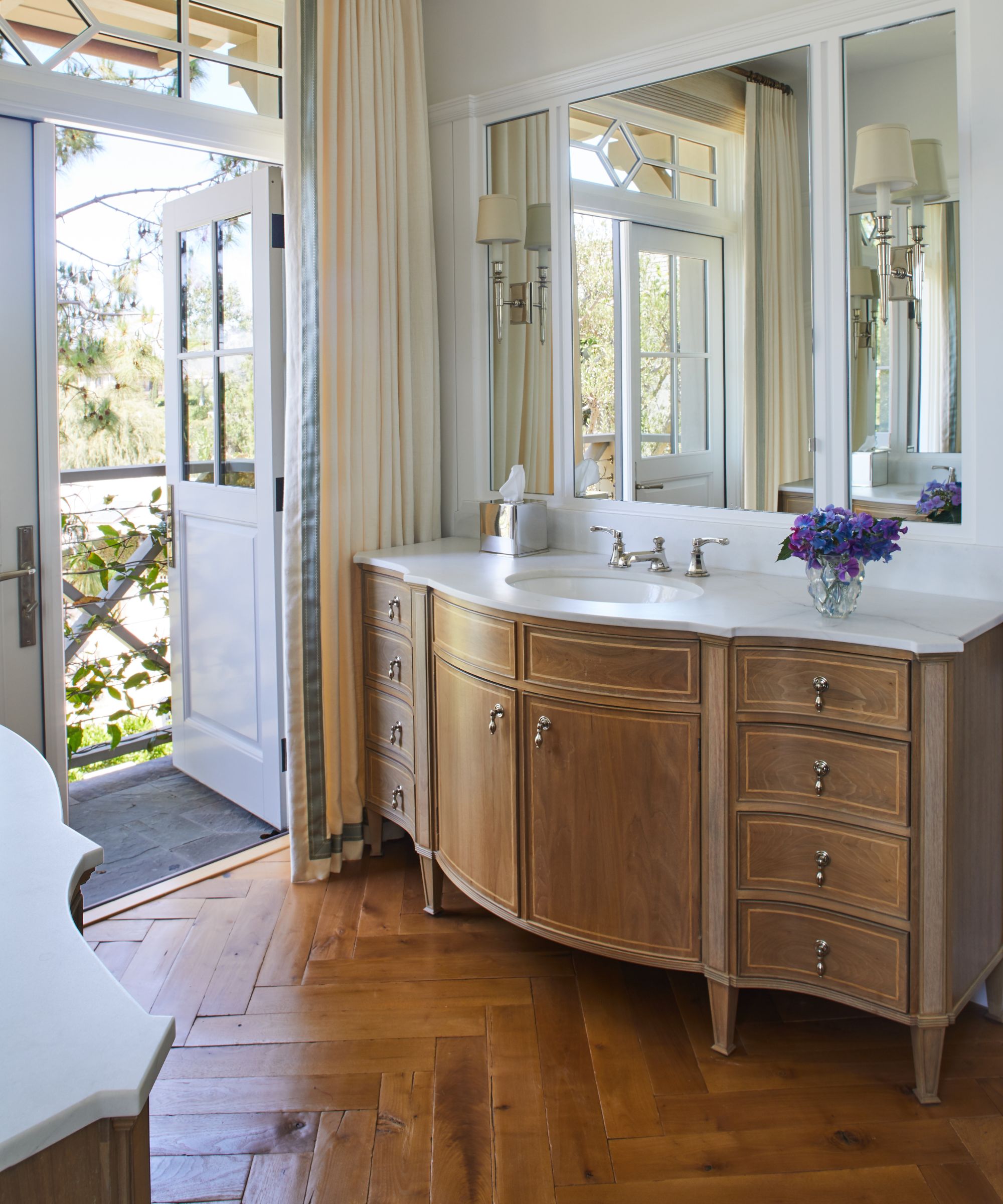
Despite the rise of more modern materials, wood remains a beloved choice for homeowners seeking to infuse their spaces with natural beauty and character.
Wooden flooring adds a sense of warmth and coziness to any room, including the bathroom. It's natural grain and warm tones create a welcoming atmosphere that can help even the most utilitarian space feel like a sanctuary.
Wood in the bathroom is slightly high-maintenance; you'll need to be careful to protect your floors from too much water – bath mats are a must! But if you want to protect your floors and add some color, paint can be a great choice. 'Painting your bathroom floor is not only an excellent way to seal and protect wooden floorboards, it is also a simple and effective way to add color and personality to a space,’ advises Ruth Mottershead, creative director of Little Greene.
6. Take up the terrazzo trend
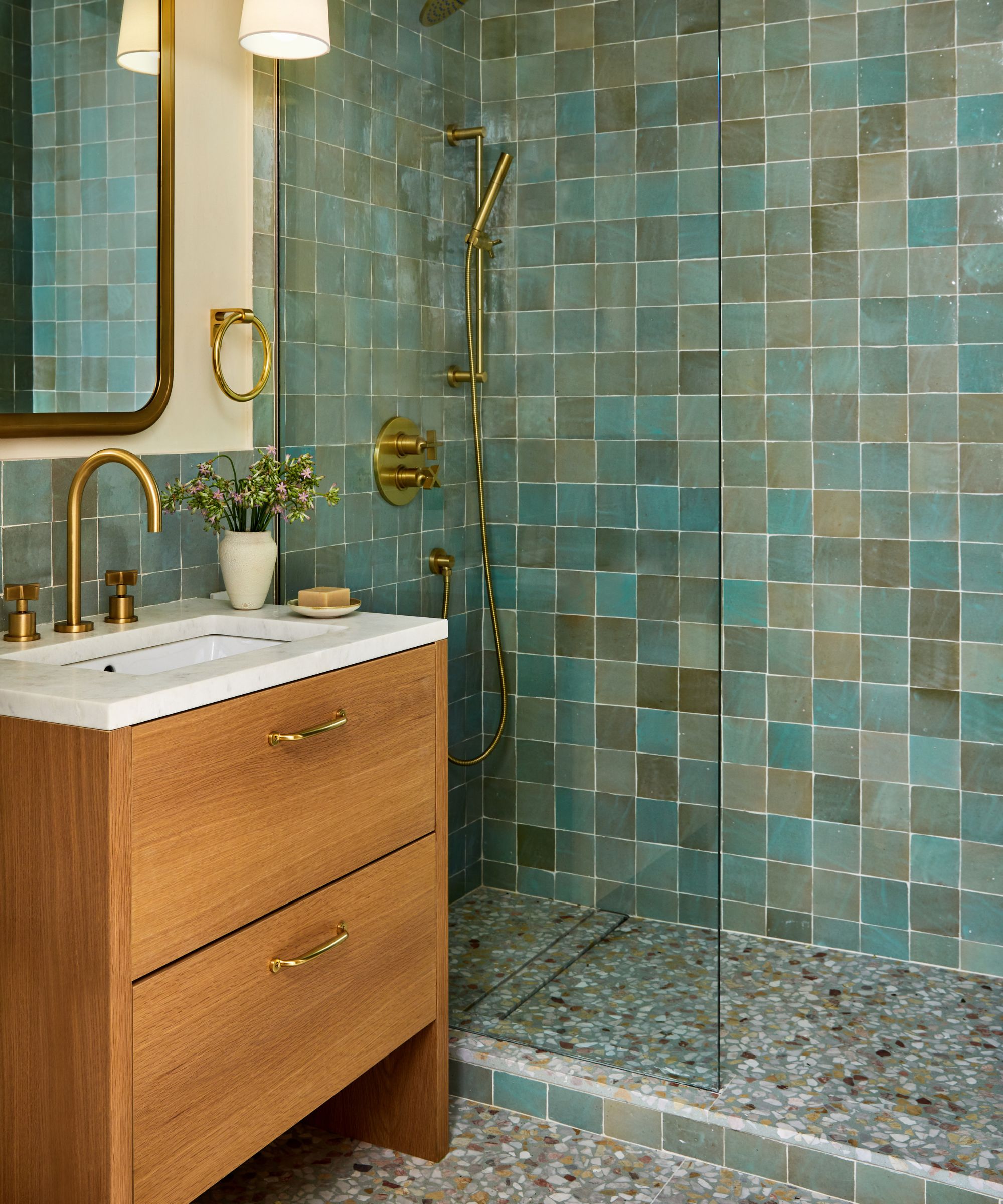
Interior design trends are incredibly circular so it makes sense that the terrazzo tile trend, once seen as an outdated tile trend, is back in favor.
'Terrazzo is a gorgeous material that we love using in bathrooms, particularly for flooring,' says Molly Torres Portnof of DATE Interiors, who designed the bijou bathroom seen above. 'It instantly elevates the space, while also bringing a serene, spa-like feel.'
Terrazzo bathrooms are right on trend for the year ahead – but this material actually dates back about five hundred years, when it was made in Italy using leftover chips of marble and granite, crushed and mixed into a cementitious base to make hardwearing flooring. Its retro style and speckled colors make it a contemporary favorite: it can be mixed, poured on-site, and sealed by specialist artisans to create a smooth, seamless bathroom floor.
7. Boost the sense of space with large format tiles
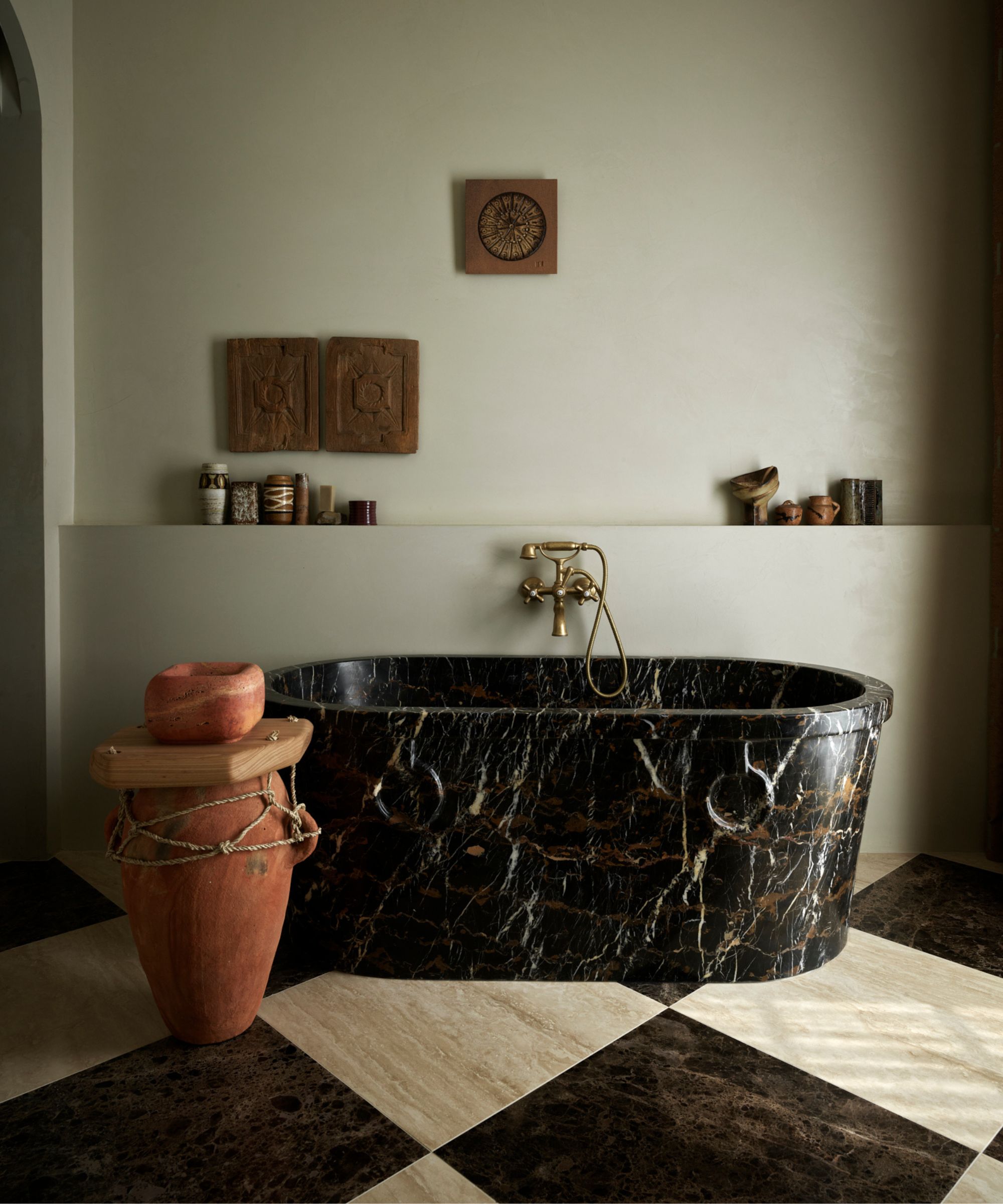
Large format bathroom floor tiles mean fewer grout lines and a cleaner, more seamless look, ideal as spa bathroom ideas with minimal visual clutter.
Big statement tiles have become increasingly popular in bathroom design for their ability to visually expand the space and create a contemporary look. Their expansive surface area results in a more open and airy feel.
Whether you prefer the timeless elegance of marble like the bathroom by Montana Labelle seen above, the industrial edge of concrete, or the warmth of natural stone, there's a large format tile option to suit every style.
Additionally, the larger size of these tiles allows for more dramatic patterns and textures, adding visual interest without overwhelming the space. Plus, their uniform size and thickness make installation faster and more efficient, reducing labor costs and minimizing waste.
8. Make the most of mosaics

On the end of the spectrum, you have teeny tiny mosaic tiles. For those seeking to add some flair and intricate detail to the bathroom, mosaics offer a customizable option by combining small, colorful tiles into intricate patterns and designs. Mosaics add a sense of personality and charm that's both timeless and unique.
Whether used as an accent border, a feature wall, or as the main flooring material, mosaics draw the eye and add a sense of drama and personality to the space. This intricate French-inspired mosaic floor, seen above by PJCArchitecture, was created using custom black and white hexagon tiles from Studium NYC. It lends the primary bathroom an elevated atmosphere and perfectly fits the homeowner’s vision.
Philip Consalvo, principal of PJCArchitecture says: 'This mosaic marble floor is a nod to the homeowner’s idea of a French bistro aesthetic. It was a true challenge due to its flowery pattern. It took a lot of careful planning to make this pattern work and feel symmetrical in an asymmetrical space!'
Mosaic tiles are usually supplied on mesh backing sheets, designed so that they can be laid in a similar way to ‘standard’ floor tiles, and to make them versatile when it comes to creating patterns and borders.
9. Get the look of wood with porcelain
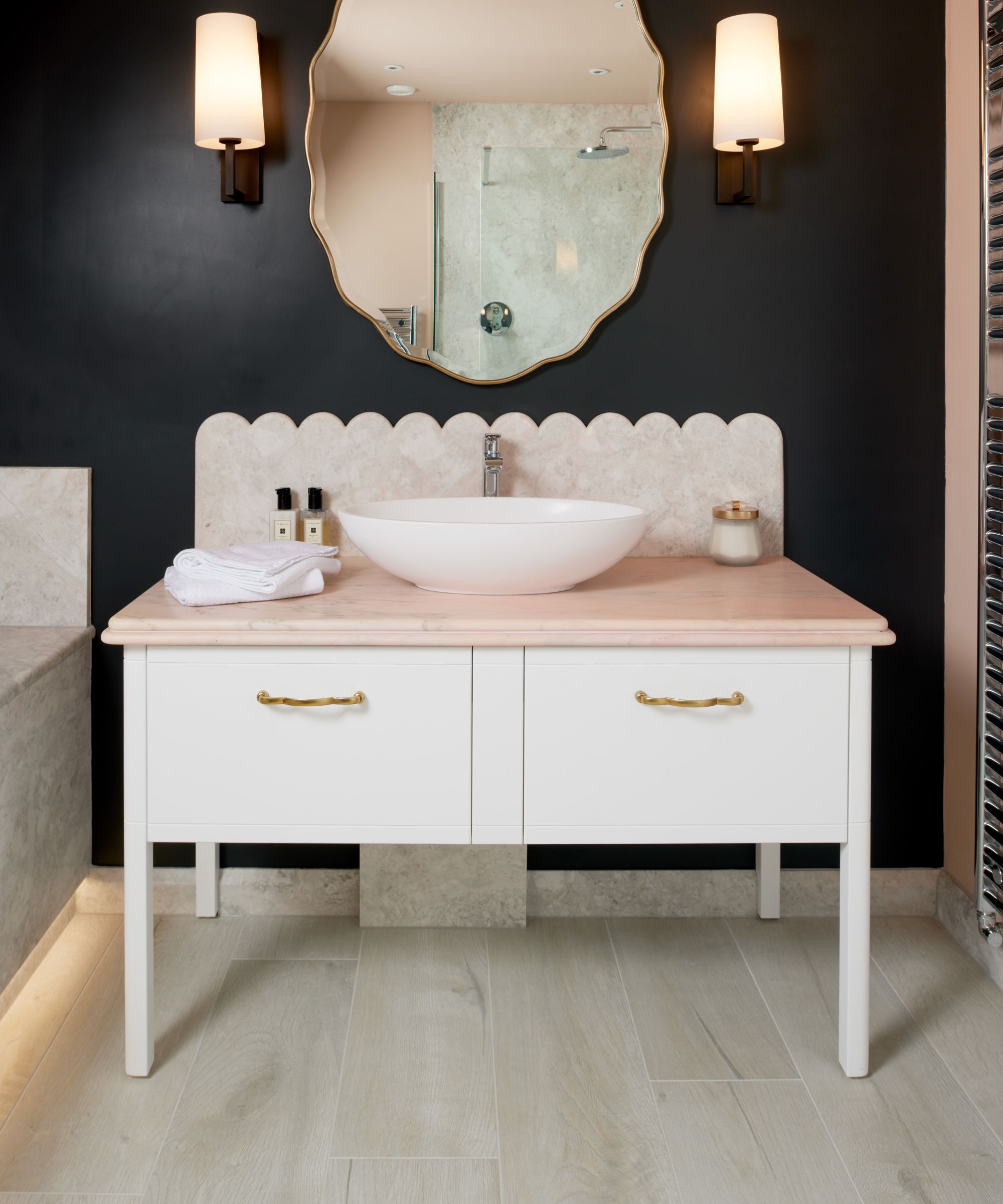
Wood can add a warm feel to a bathroom, its natural hues offsetting any sense of clinical. But real timber floor planks are not for everyone and they aren't always the best choice for a bathroom floor. Porcelain wood-effect tiles offer the best of both worlds: the timeless appeal of wood flooring with the durability and water resistance of tile.
To recreate the look without the worry, manufacturers have been busy employing the latest technology to produce porcelain wood-effect tiles, which mimic the look and texture of the real thing, complete with natural-looking grains and knots, in an ultra-practical, waterproof, and consistent material.
'A wood-effect bathroom floor can feel comforting and charming in a period property, or style it differently and place it in a modern setting,' suggests Grazzie. 'Like in this bathroom, you can create a blonde wood Scandi bathroom that transports you to Stockholm with every visit.'
'It goes without saying that choosing a wood-effect floor tile over the real deal provides oodles of benefits, including little-to-no maintenance – there is no sanding or sealing – and you don't have to worry about it getting wet. It can even be used in wet rooms and within shower areas so that your floor has a continuous run of tiles.'
10. Infuse a Mediterranean look with terracotta
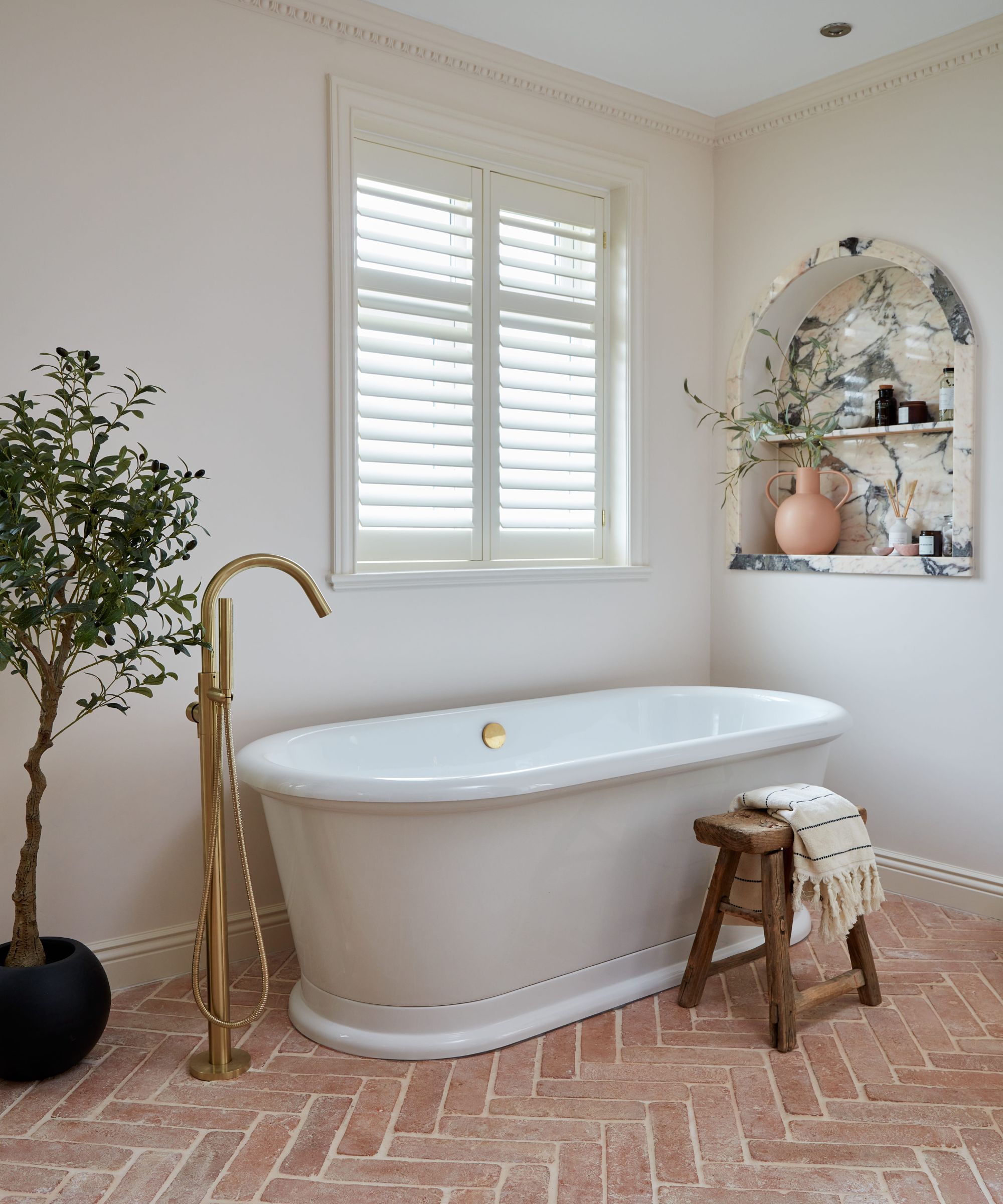
Terracotta bathroom tiles are a timeless choice for bathroom flooring. It's warm, textured, and gives a subtle rustic finish to schemes. It's a popular choice in Mediterranean bathrooms, but it works well in plenty of styles.
In this bathroom, terracotta floor tiles have been introduced to a newly remodeled bathroom to add character and a more traditional detail. Here, the tiles have been paired with white walls and wooden details, but they look beautiful combined with more colorful hues, too.
'A gentle blush or dusky rose brings out the warmth in terracotta, creating a scheme that feels both unexpected and incredibly considered. It’s a tonal match that’s softer than you’d imagine, but one that still makes a subtle statement,' says Grazzie.
Terracotta floor tiles have come a long way from their humble beginnings. In this scheme, a classic herringbone floor tile pattern has been created using brick-style tiles, but there are plenty of shapes to consider.
'Terracotta tiles tend to have an old-world or rustic feel, but are being made in a lot of different shapes these days. As such, they can be laid out with a more contemporary stacked bond, for instance, which can be a fun juxtaposition,' adds Kate Donahue of Four Brothers Design + Build.
11. Tile drench a bathroom for a bold look
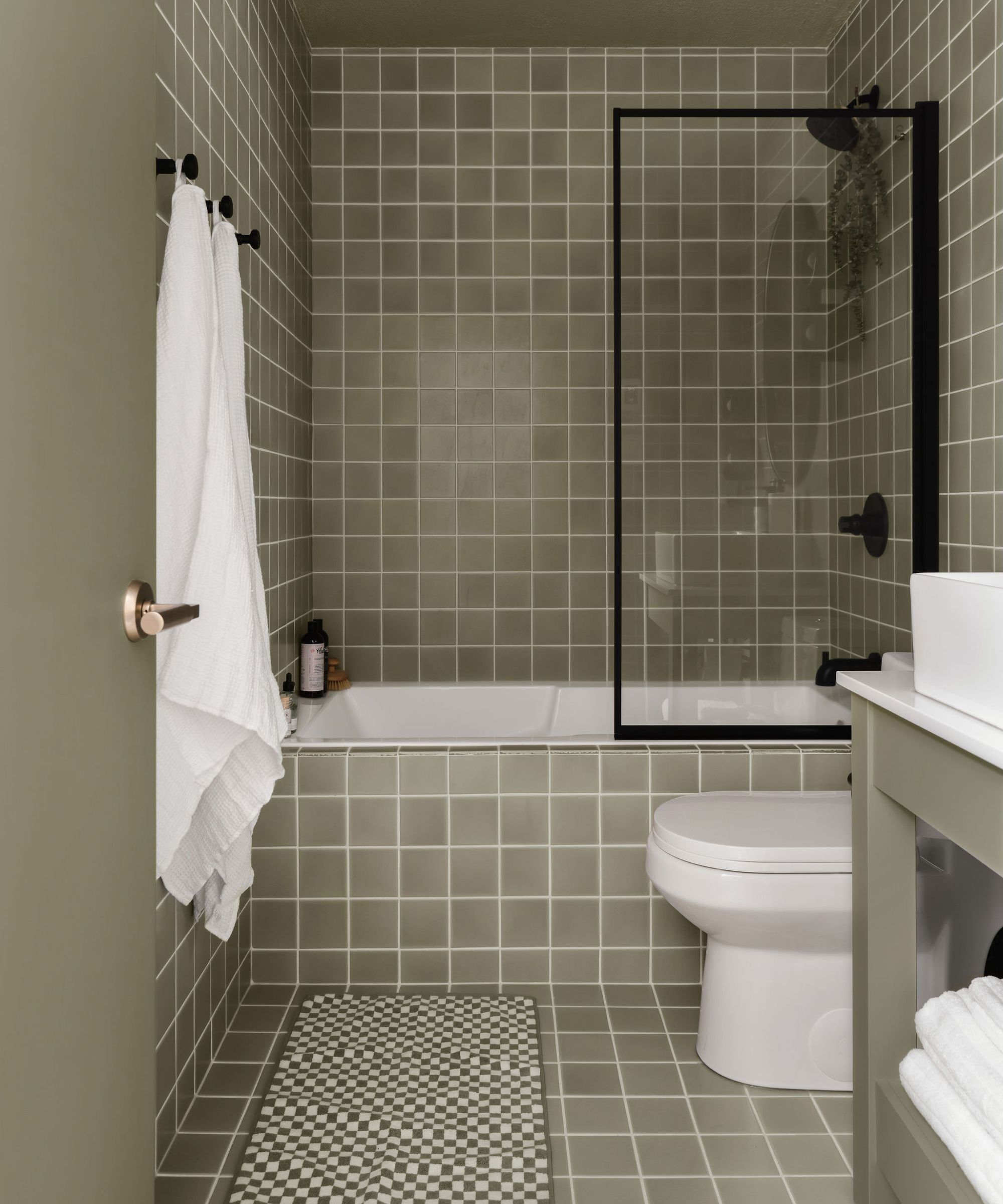
While your bathroom floor and wall tiles don't need to match – the contrast often creates a more dynamic, spacious design – the tile drenching trend offers a rare opportunity to create a daring statement with your bathroom flooring ideas.
This bathroom proves how impactful the look can be. By bringing the same square green tiles from the walls across the bathroom floor, a bold yet inviting space has been created.
It's definitely a statement to decorate a bathroom in all one color and tile, but done right, the floor space looks bigger and the scheme feels really statement. It even has an almost retro vibe to it, which is always in style.
12. Go super contemporary with microcement

Microcement is another game-changer in modern bathroom design. Its smooth, seamless surface and minimalist aesthetic lend itself perfectly to contemporary interiors, making it a popular choice among homeowners and designers alike.
Barrie Cutchie, design director at BC Designs, says: 'A big trend in bathroom flooring is concrete, but this can be expensive and heavy, especially in upstairs bathrooms. A great alternative is to use microcement, which is a specialist coating that can be applied to any hard surface and replicates the design aesthetics of real concrete for a modern, minimalist design. Best of all, it is water-proof and suitable for underfloor heating, so it makes the perfect alternative to tile design for a walk-in wet room.'
'Use this material to maximum potential by creating a modern bathroom of dreams,' adds Barrie. 'Choose to double up or go as large as possible, with double showers and a large, with modern, smooth curves.'
13. Embrace a timeless pattern with stripes
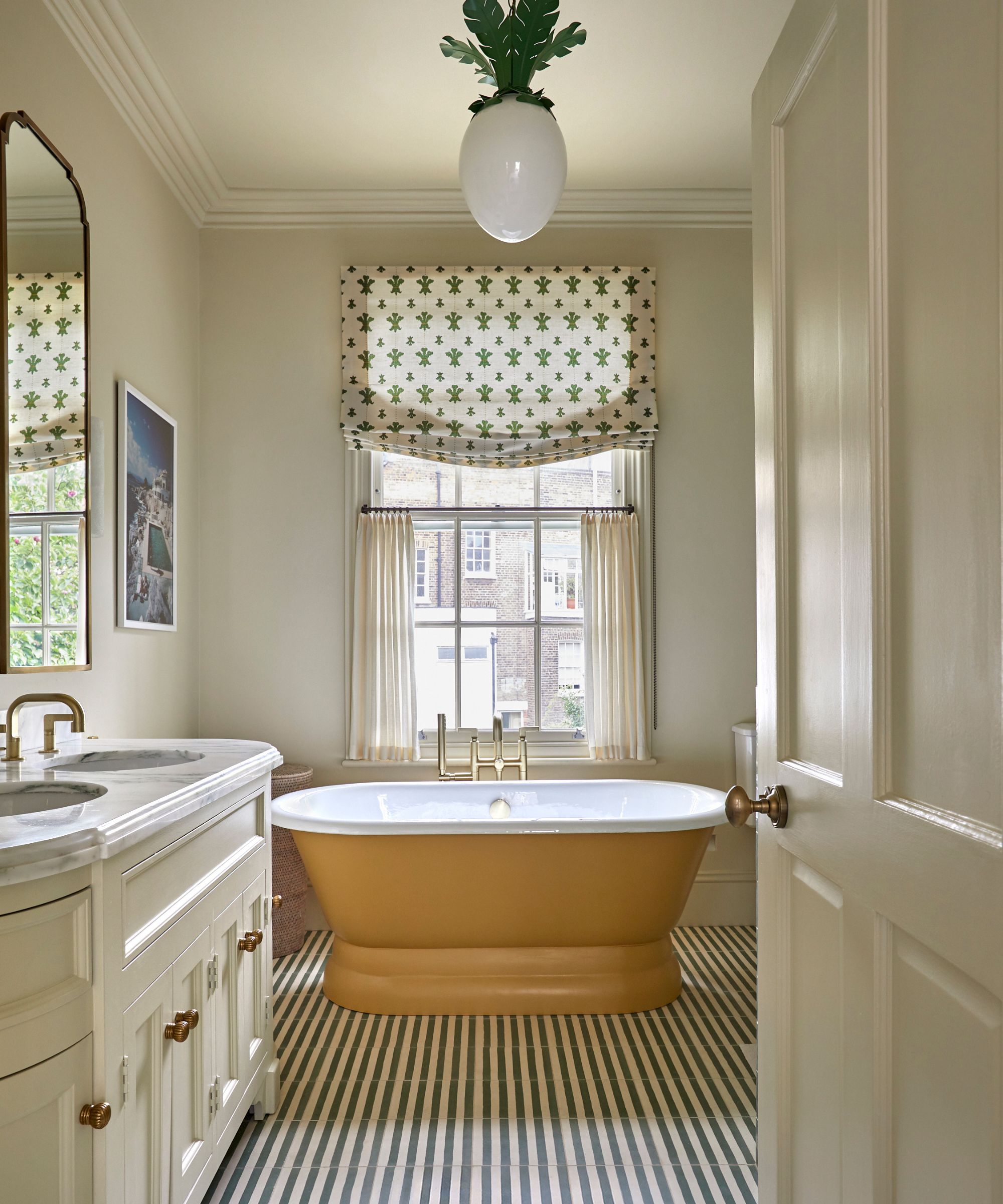
Big news in bathroom floor tile trends for 2025 is the striped tile. Whether you opt for bold, contrasting stripes or subtle, tone-on-tone variations, incorporating this timeless pattern into your bathroom design is a surefire way to add sophistication to the space.
‘Using bold bathroom floor tile ideas is a wonderfully effective way to elevate a bathroom – it grounds the room, emphasizes the sense of space and scale, and packs a chic punch without being too overwhelming,’ enthuses interior designer Samantha Todhunter. To appreciate the point, simply imagine this space with plain floor tiles.
From classic horizontal stripes to modern vertical or diagonal variations, there's a striped pattern to complement any home. They can also visually elongate a space, making it appear larger and more spacious. This makes them particularly well-suited for smaller bathrooms, where creating the illusion of space is key.
14. Look to handmade tiles for a rustic feel
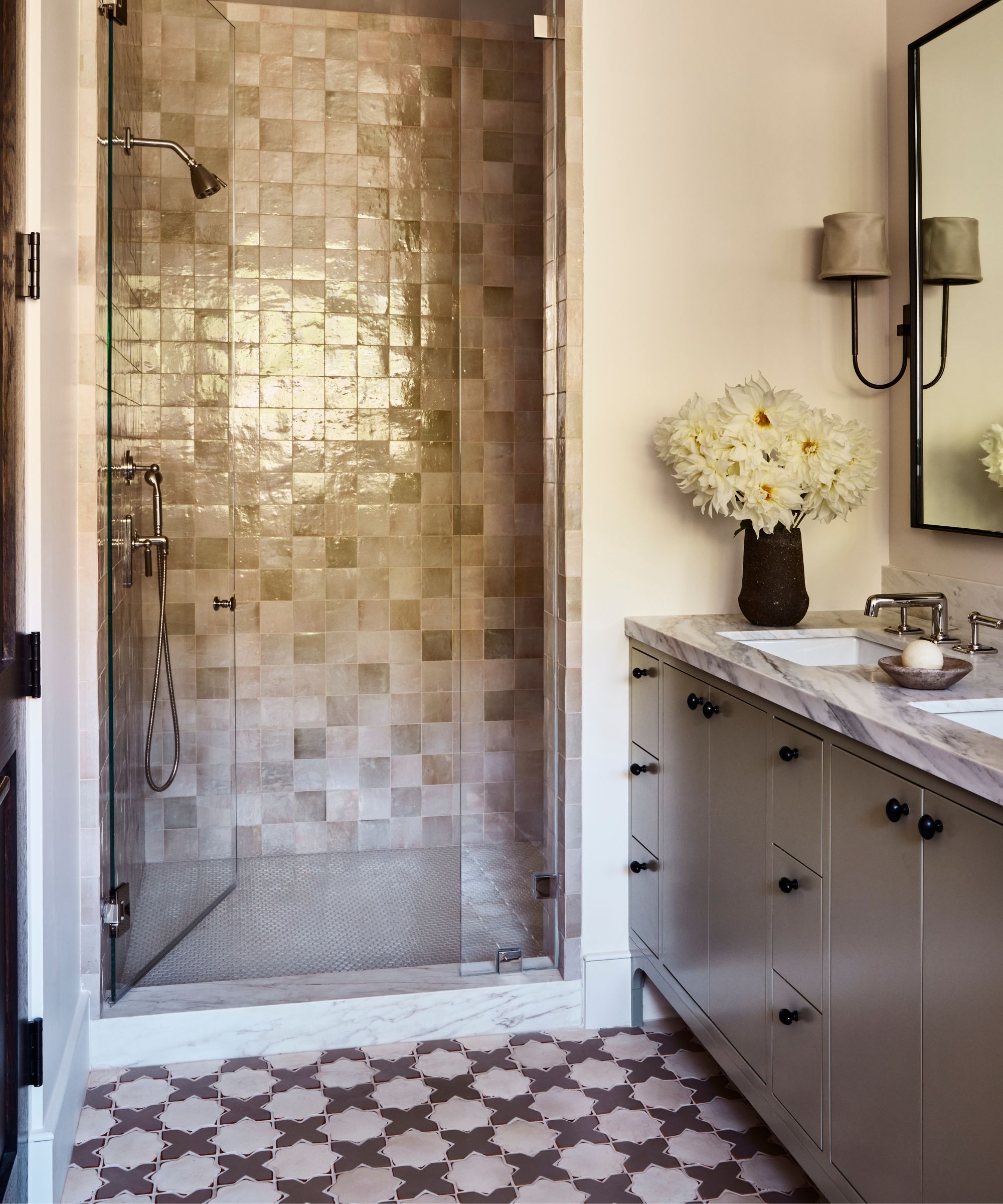
For those of you yearning to infuse your bathroom spaces with warmth, character, and artisanal charm, handmade tiles are a delightful option for more rustic bathrooms.
Crafted with care and attention to detail, handmade tiles add a unique and authentic touch to the flooring, creating a cozy and inviting feel. Their inherent warmth and texture also provide traction underfoot, enhancing both safety and comfort.
One of the key advantages of handmade tiles is their ability to create a truly bespoke look. Their irregular shapes, subtle imperfections, and organic textures add depth and character that can't be replicated with mass-produced materials. This individuality allows you to create a one-of-a-kind flooring design that reflects your personal style.
From traditional terracotta and earth tones to vibrant blues and greens, there's a handmade tile option to complement any rustic-inspired theme.
15. Take your floor tiles up and over the walls too
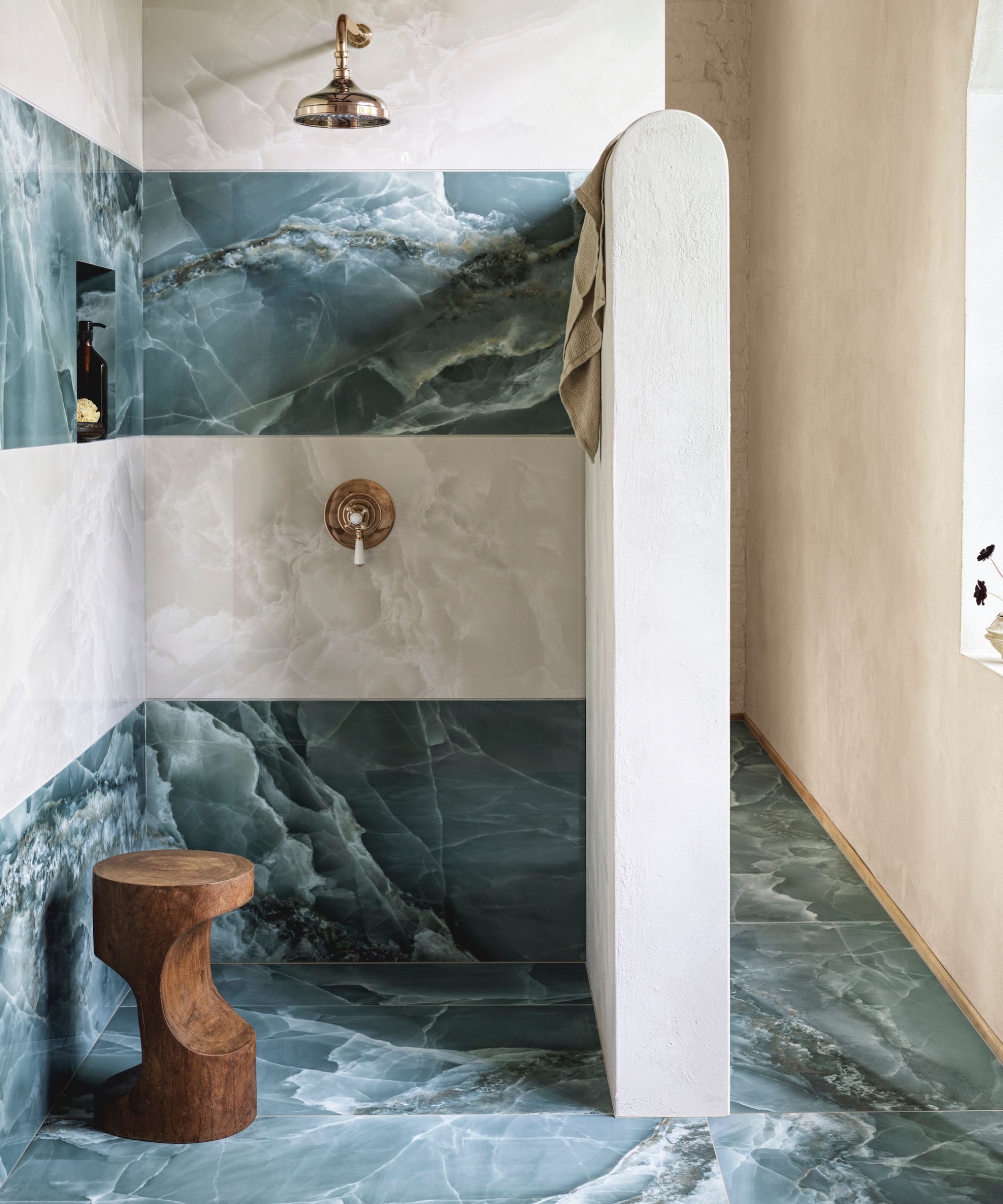
By blurring the boundaries between floor and wall surfaces, this design approach not only adds interest and drama but also creates a sense of expansiveness, making the space feel larger and more cohesive.
'For small bathrooms, floor-to-ceiling tile is a great design strategy,' says Sarah Jefferys, principal at Sarah Jefferys Architecture + Interiors. 'In a small space, it’s better for materials to extend the full length and width of the walls so the space feels expansive and continuous.'
James Sirett from Fired Earth agrees. 'Using the same tiles across walls and floors can help to achieve a flowing, space-enhancing feel that works really well in compact bathrooms. It's also a simple way to create a wet room-style scheme,' he adds.
Using the same tiles on both the floor and walls also streamlines the design process and simplifies maintenance. Attention to detail is key, however, particularly when it comes to aligning patterns and ensuring consistent grout lines.
What is the best type of flooring for a bathroom?
Arguably, the best and most popular type of flooring for a bathroom is tile. Enduringly popular because they are ultra-practical and available in a great variety of colors, styles, sizes, and price points, tiles are designed to suit every taste and budget.
Latest generation porcelain floor tiles are not only hardwearing with almost zero porosity, but they are also available in a myriad of different patterns and neutrals, plus ultra-realistic wood and stone effects. Here are a few materials experts always favor for bathroom flooring:
Porcelain tiles
The “best” flooring material for bathrooms and wet areas is porcelain. Hardwearing, non-porous, and available in any color, pattern, and material imitation, porcelain provides an incredible level of design detail.
Made from kaolin clays fired at very high temperatures, porcelain is easy to maintain and clean, will not wear or weather over time, works with underfloor heating, and is available in a wide range of formats, including mosaics, and at a choice of price points to suit just about any project.
Interior designer Chantel Elshout favors opting for tactile porcelain options. ‘Textured porcelain tile is a great way to add a real luxe spa feel to your bathroom,’ she says. ‘Chevron wood effect tile is another good option for a warm look and tactile feel, without the maintenance hassle.’
Natural stone tiles
For a more luxurious, high-end look, you might want to consider a more natural option. Another popular flooring material is natural stone, which offers authentic character and beauty, with no two pieces ever the same.
However, natural stone – and this is especially relevant if you are considering marble bathroom flooring ideas – is relatively ‘soft’ and porous in comparison to porcelain. It requires sealing and careful maintenance, and will unavoidably scratch, stain, and weather over time.
Cement encaustic tiles
As a handmade product, each tile will be subtly different in color, line, and dimension, which many feel adds to their beauty. Available in a wide choice of plain and patterned designs, they have a characteristic depth of color. They do require sealing and ongoing maintenance to protect against staining.
‘I particularly love large and colorful encaustic tile laid in a checkerboard pattern on a bathroom floor,’ says interior designer Anna Haines. ‘They have a wonderful chalky finish.’ Anna has recently installed them in a small bathroom to great effect, finished with a border of skinny subway tile.
Wood flooring
Another natural material, wood flooring, is a popular choice, especially in traditional bathrooms. However, it can be prone to damage from excessive contact with water that isn't wiped up immediately, which is why engineered wood alternatives are proving popular.
Engineered wood is often recommended because of its more stable construction – a layer of solid wood on a base made up of layers of ply. Hard wax, oil, or lacquer finishes tend to be most practical. Do not use wood flooring in wet rooms, and always consult your supplier regarding suitability for bathroom use before purchase.
Anna suggests using engineered oak laid in a herringbone formation. ‘It makes the bathroom feel more like a “real” room, especially with an antique rug or kilim on top to give a sense of intimacy and comfort,’ she says.
Vinyl, rubber, and cork
Scoring points for their warmth and softness underfoot, vinyl bathroom flooring, plus those in cork (when well sealed) or rubber, are also hardwearing and waterproof, making them a good choice for bathroom use, especially family spaces. They are also easy to clean and usually suitable for use with underfloor heating.
How do I choose bathroom flooring with slip resistance?
The golden rule to finding the best non-slip bathroom flooring ideas is to seek your supplier’s advice regarding the anti-slip qualities of your chosen material. Typically, smaller tile with more grout lines offers more slip resistance than larger format. Some tile suppliers use R (Ramp test) ratings, ranging from R9 to R13, which has the highest slip resistance.
‘Where possible, we will always try to source any large format porcelain tiles with a minimum rating of R10 or above,’ advises Richard Reese, technical expert at Claybrook. ‘Ultimately, in domestic situations, it is up to the owner what they want to use, but for those still concerned, in recent years, the development of long-lasting anti-slip treatments has significantly improved. These are applied post-installation and, in most cases, do not alter the appearance of the tile.’
How much does bathroom flooring cost?
Bathroom flooring costs will depend on the size of your space and the types of flooring you choose. But to work out how much your flooring will cost based on a style you like, measure the size of the floor, multiplying the length by the width to calculate its size in square feet (or square meters). This will allow you to calculate the approximate cost of the tile or other flooring. Remember to add on about 10-15% extra to allow for cutting and wastage when using tile, and to factor in the cost of adhesives, grout, and installation, as required.
There may also be costs in removing an old floor and in preparing the sub-surface to ensure it is level and ready for installation of a new material: your contractor can advise. Then, of course, you will need to know how much it costs to install bathroom flooring you have chosen. Again, your contractor can advise, unless you want to learn how to lay bathroom floor tiles and do the work yourself.
Whether you're drawn to the warmth of traditional wooden flooring, a myriad of tile colors, patterns and textures, or the contemporary allure of micro-cement, the key is to choose a bathroom flooring idea that not only complements your design aesthetic but also meets the practical needs of your household.
So, whether you're embarking on a full-scale renovation or simply looking to refresh your space, let these flooring ideas inspire you to create a design that's as beautiful as it is functional.

Charlotte is the style and trends editor at Homes and Gardens and has been with the team since Christmas 2023. Following a 5 year career in Fashion, she has worked at many women's glossy magazines including Grazia, Stylist, and Hello!, and as Interiors Editor for British heritage department store Liberty. Her role at H&G fuses her love of style with her passion for interior design, and she is currently undergoing her second home renovation - you can follow her journey over on @olbyhome
- Molly MalsomKitchens & Bathrooms Editor
